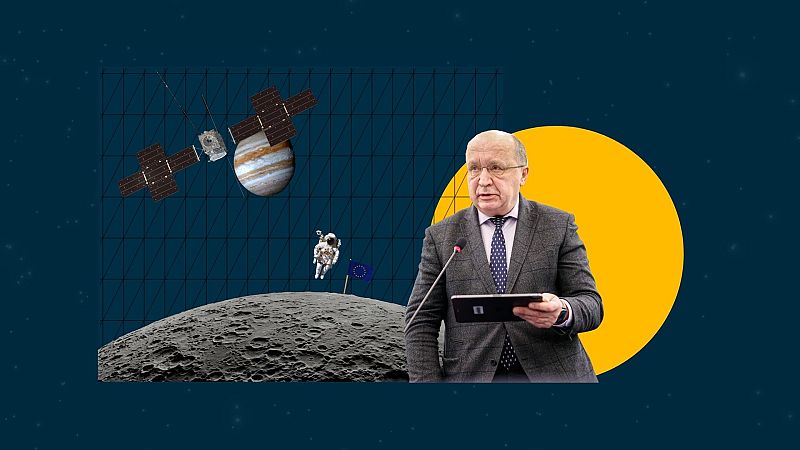Is EU's first space commissioner launched on low-orbit mission?

Andrius Kubilius, the Lithuanian commissioner-designate, has been given a newly-created portfolio with responsibility for both EU defence and space - yet researchers and industry representatives fear that despite the many challenges, space will end up as a secondary priority with no real ambition.
"I'm a bit worried that because there's so little work being done on space [policy], there will be no interest, no budget, no nothing," Reinhilde Veugelers, senior fellow at the Brussels-based economic think tank Bruegel, told Euronews.
In her mission letter to Kubilius, Commission President Ursula von der Leyen gives the former Lithuanian prime minister a mission of continuity, calling for further implementation of the EU's space strategy for security and defence and to maintain the bloc's ‘cost-effective access to space’.
But von der Leyen foresees only two new proposals for the next five-year mandate: the EU space law, which was expected before the summer break, and a space data economy strategy to unlock the potential of space-derived data, products and technologies.
"There is a clear challenge to scale up the ambition in the new commissioner's portfolio," said Tomas Hrozensky, senior researcher at the European Space Policy Institute (ESPI), noting that while the role of space in security and defence has received unprecedented recognition at the policy level, the institutional, programmatic scale of support is still lacking and the industrial dimension is undervalued.
Overall, European institutional funding of space programmes is fragmented and only 20% of the US level, creating an imbalance with key competitors such as the US and China in terms of industrial capacity and specialised workforce, said Mario Draghi's landmark report on competitiveness.
Draghi's assessment of the challenges facing the space industry in the future is accurate, but fails to address the potential for commercialisation and remains conservative in proposing solutions, some argue.
"There is no appeal for increased funding in security and defence, except for what is already budgeted by member states, nor a proposal for human space exploration," says a policy brief from the European Space Policy Institute.
The space economy is estimated to be worth $1 trillion [€899bn] by 2040, while the value of space to the wider economy and society is projected to be around $7.9 trillion, including the multiplier effect on the battery, semiconductor and pharmaceutical industries, according to a study by the Boston Consulting Group.
"The space economy is an important sector in itself, irrespective of [national] differences, so there's a lot of commercial activities, space services, where there's a lot of value creation and possible value capture and where Europe is falling behind tremendously," Veugelers added, claiming that only these kinds of activities are worth developing in an industrial policy.
Fragmentation and low investment in space will mark Kubilius' agenda
Looking ahead, there are several challenges Kubilius will need to tackle: not enough money being spent on research and development, limited access to funding for companies, a fragmented governance system, and a lack of cooperation among EU countries.
Europe's space industry is particularly concerned about how these problems will affect the sustainability of supply chains, the preservation of expertise, and the EU’s strategic independence, according to Olivier Lemaitre, secretary general of ASD-Eurospace, who spoke to Euronews.
“The EU should urgently address the issue of the security of the European space supply chains by devising an industrial policy for space in collaboration with the member states,” Lemaitre said.
Today, the EU remains competitive in areas like Earth observation, navigation, and exploration, but it has lost its leading market position in commercial launchers (Ariane 4-5) and geostationary satellites – which even forced the EU to temporarily depend on US SpaceX rockets to launch its satellites.
In recent years, the EU has fallen behind in space activities and faced significant supply chain disruptions, first due to the Covid-19 pandemic and then as a result of Russia's invasion of Ukraine.
As a result, the EU's space industry has become less profitable, with lower sales, especially in launchers and satellite systems, and has become more reliant on components like semiconductors and detectors, as Draghi pointed out.
Lemaitre believes it'll be crucial for the EU and its member states to come up with and implement strategies that stabilize production, promote large-scale manufacturing, increase the use of recurring systems for operational missions, and develop standardized interfaces.
For the Bruegel researcher, a closer link between the space and defence portfolios could already be a first improvement in the short term.
"We're not exploiting the potential complementarities that would make defence and space work more effectively," said Veugelers.
Today

